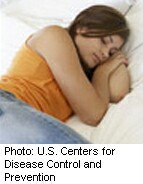 |
 |
 |

Poor Sleep Linked to High Blood Pressure in Teens
Similar results have been found in studies of adults|
|
HealthDay
Monday, August 18, 2008
 MONDAY, Aug. 18 (HealthDay News) -- Teens who don't get enough sleep or have poor-quality sleep run the risk of elevated blood pressure, a new study finds.
MONDAY, Aug. 18 (HealthDay News) -- Teens who don't get enough sleep or have poor-quality sleep run the risk of elevated blood pressure, a new study finds.
It's the first study to make such a connection, said study senior author Dr. Susan Redline, director of the University Hospitals Sleep Center at Case Western Reserve University in Cleveland.
"In adults, there has been evidence that less than six hours of sleep a night was associated with high blood pressure levels," said Redline, who is professor of medicine and pediatrics at Case Western Reserve. "No study has been done in adolescents."
Redline and her colleagues studied 238 boys and girls ages 13 to 16, asking about their sleep habits. They found that 11 percent of them slept less than 6.5 hours a night, and 26 percent had poor "sleep efficiency," with frequent awakenings at night.
One of every seven teens in the study had either hypertension, which is high blood pressure greater than 120 over 80, or borderline high blood pressure called prehypertension. Teens with less than 85 percent sleep efficiency had nearly three times the odds of high blood pressure, the researchers reported.
"That was one of the more unique findings, that poor sleep quality is associated with high blood pressure," Redline said.
The study was published in the Aug. 19 issue of the journal Circulation.
While it's too early to tell where poor sleep ranks among the risk factors for high blood pressure, Redline said, "In our study, it was stronger than being overweight."
The Case Western researchers will continue to follow the teenagers "to see how their blood pressure is developing over time," she said.
Dr. Stephen R. Daniels, pediatrician-in-chief at the Children's Hospital in Denver and a spokesman for the American Heart Association, noted that the new study is preliminary, but "it does point to the direction that the next studies need to go to understand what less sleep and less efficient sleep mean in terms of blood pressure."
If the findings hold up, they could eventually influence school system schedules, Daniels said. Schools now start later in the morning for younger students and earlier for teenagers, he said. "But the changes in the diurnal patterns for adolescents make it harder for them to get up in the morning and to get to sleep at night. If we reorganize the day-night schedule for adolescents, that could make life easier for them and their parents," he added.
Dr. Richard D. Simon Jr., medical director of the Kathryn Severyns Dement Sleep Disorders Center in Walla Walla, Wash., said the study findings make biological sense.
"We do know that in adults, poor sleep and a diminished amount of sleep are associated with obesity and hormone intolerance," Simon said. "Changes occur in the sympathetic nervous system. Also, fragmentary sleep activates inflammatory pathways."
All the experts agreed that better sleep for teens could be achieved by what Redline called "optimizing sleep hygiene, following regular sleep habits, turning the light off approximately the same time every night, keeping the bedroom quieter, and avoiding substances that may disturb sleep, such as caffeine."
"Kids as well as adults need to be allowed to sleep enough," Simon said. "We say eight hours of sleep a night, but it takes an hour to wind down. It's very, very hard to allow enough time to sleep."
HealthDay
Copyright (c) 2008 ScoutNews, LLC. All rights reserved.
Related News:
More News on this Date
Related MedlinePlus Pages:
| Home | Health Topics | Drugs & Supplements | Encyclopedia | Dictionary | News | Directories | Other Resources | |
| Disclaimers | Copyright | Privacy | Accessibility | Quality Guidelines U.S. National Library of Medicine, 8600 Rockville Pike, Bethesda, MD 20894 National Institutes of Health | Department of Health & Human Services |
Date last updated: 19 August 2008 |




